跨文化交际背景下的中英文禁忌语对比研究---毕业论文 精品
跨文化交际中中英禁忌研究文献综述
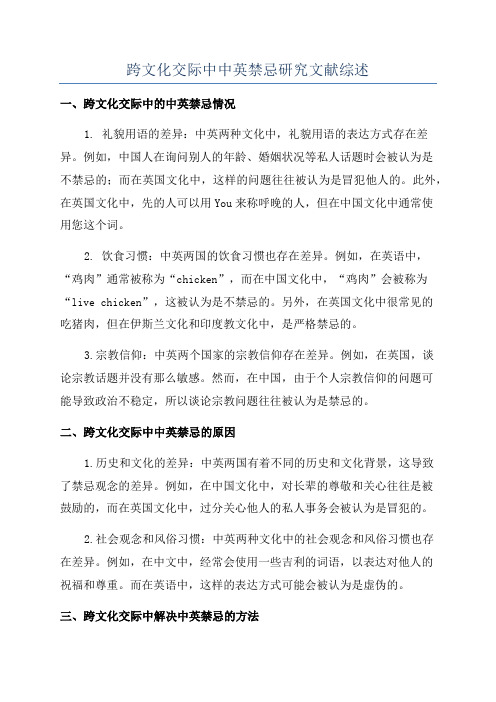
跨文化交际中中英禁忌研究文献综述一、跨文化交际中的中英禁忌情况1. 礼貌用语的差异:中英两种文化中,礼貌用语的表达方式存在差异。
例如,中国人在询问别人的年龄、婚姻状况等私人话题时会被认为是不禁忌的;而在英国文化中,这样的问题往往被认为是冒犯他人的。
此外,在英国文化中,先的人可以用You来称呼晚的人,但在中国文化中通常使用您这个词。
2. 饮食习惯:中英两国的饮食习惯也存在差异。
例如,在英语中,“鸡肉”通常被称为“chicken”,而在中国文化中,“鸡肉”会被称为“live chicken”,这被认为是不禁忌的。
另外,在英国文化中很常见的吃猪肉,但在伊斯兰文化和印度教文化中,是严格禁忌的。
3.宗教信仰:中英两个国家的宗教信仰存在差异。
例如,在英国,谈论宗教话题并没有那么敏感。
然而,在中国,由于个人宗教信仰的问题可能导致政治不稳定,所以谈论宗教问题往往被认为是禁忌的。
二、跨文化交际中中英禁忌的原因1.历史和文化的差异:中英两国有着不同的历史和文化背景,这导致了禁忌观念的差异。
例如,在中国文化中,对长辈的尊敬和关心往往是被鼓励的,而在英国文化中,过分关心他人的私人事务会被认为是冒犯的。
2.社会观念和风俗习惯:中英两种文化中的社会观念和风俗习惯也存在差异。
例如,在中文中,经常会使用一些吉利的词语,以表达对他人的祝福和尊重。
而在英语中,这样的表达方式可能会被认为是虚伪的。
三、跨文化交际中解决中英禁忌的方法1.尊重和理解:在跨文化交际中,尊重和理解是最重要的。
了解对方的文化背景,尽量避免触碰对方的敏感点,展示对对方文化的尊重。
2.学习和批判性思考:不断学习不同文化之间的禁忌和差异,不只是表面地接受和遵循其中一种文化规范,还要批判性地思考,并意识到不同文化之间的禁忌是可以变化的。
3.沟通和妥协:在进行跨文化交际时,沟通是至关重要的。
学会解释自己的意图,避免产生不必要的误解。
同时,也要学会妥协,尽量迁就对方的文化规范。
中英禁忌语对比研究
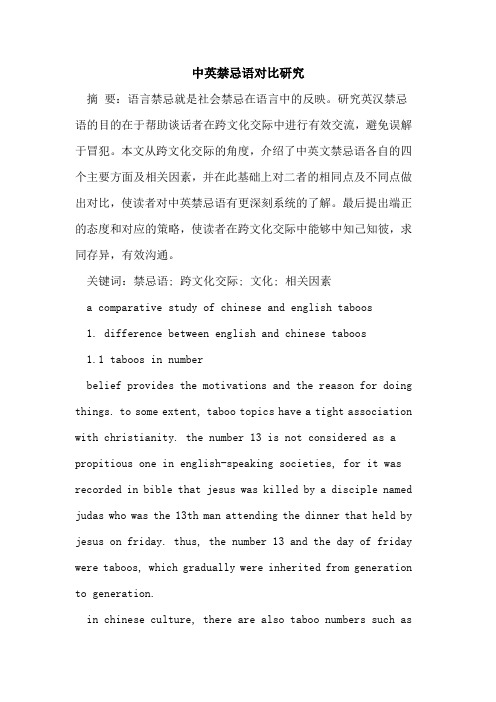
中英禁忌语对比研究摘要:语言禁忌就是社会禁忌在语言中的反映。
研究英汉禁忌语的目的在于帮助谈话者在跨文化交际中进行有效交流,避免误解于冒犯。
本文从跨文化交际的角度,介绍了中英文禁忌语各自的四个主要方面及相关因素,并在此基础上对二者的相同点及不同点做出对比,使读者对中英禁忌语有更深刻系统的了解。
最后提出端正的态度和对应的策略,使读者在跨文化交际中能够中知己知彼,求同存异,有效沟通。
关键词:禁忌语; 跨文化交际; 文化; 相关因素a comparative study of chinese and english taboos1. difference between english and chinese taboos1.1 taboos in numberbelief provides the motivations and the reason for doing things. to some extent, taboo topics have a tight association with christianity. the number 13 is not considered as a propitious one in english-speaking societies, for it was recorded in bible that jesus was killed by a disciple named judas who was the 13th man attending the dinner that held by jesus on friday. thus, the number 13 and the day of friday were taboos, which gradually were inherited from generation to generation.in chinese culture, there are also taboo numbers such as4, 73, 84. in chinese, the number 4(si) has a same pronunciation with the word death(si), accordingly, we usually think the number 4 is unlucky and should be avoided, which customs are reflected in the chinese language use. 1.2taboos in privacy regarding age, weight, income and so on.as is known to all, the westerners place a high value on privacy. they are self-centered and hold the views that their individual interests can’t be invaded at any time. the questions related to one’s age, weight, income, marriage will never be asked; otherwise they will entice more prejudice, and offence. yet, it is not the case in china. in fact, there is no equivalent term for “privacy”in chinese. the spirit of collectivism is treasured by chinese people from one generation to another. on the other hand, chinese people enjoy living together with their family members because it is a way to show harmony in the chinese view of thinking. it is not strange for us to find that even people from different families share a big courtyard in china. further, people in china don’t favor changing their homes frequently from one place to another. consequently, the chinese family members always live in one place through the whole life and they areought to be very family with people who share the courtyard with them. we have a saying to the effect that”远亲不如近邻”, which means when in trouble, the one who can help you is not the relatives who live far away from you, but your neighbors.2. similarities between english and chinese taboos2.1 religion and godin many western countries, a large number of people believe in christianity or catholicism, which is widely accepted and became the source and fertile soil of english taboos. as for english-speaking societies, people have a strong sense of religion and they think thoughts are controlled by religious belief and feudal ethical codes. further, owing to the productivity in the remote times was so low that some natural phenomena could not be explained, people at that time held that some religious words or expressions had a mysterious and supernatural power, so names of god and devil such as jesus, christ, joseph, heaven, hell have to be completely avoided on many occasions. yet, it is inevitable to mention the word “god”during the communication sometimes, so euphemism was created by the westerners to avoid directly mentioning the holy names. compared with religious verbal taboos inenglish-speaking countries, there are similar taboos about god in chinese as well. in the chinese view of thinking, god enjoys such an absolutely high power that no one or other things have a capability to exceed. if a person wants to cite god as his witness while making his vows, such phrases as “天”(sky)“上天作证”,”对天发誓”,or “上苍见证”will be chosen to express his feeling. besides, people have such expression in chinese as “妖魔鬼怪”,”钟馗捉鬼”and “鬼来了”.2.2 secretions and excretionsin western countries, words related to the behavior of excretions seem to be vulgar, they are always substituted by so-called elegant words in the conversation of sociality, since words about secretions and excretions are considered to be tabooed and should be absolutely banned from general use in public. both in english-speaking countries and in china, words concerning the behavior of urination and defecation are entirely abstained especially in eating; otherwise, they seem to be lousy. in terms of the chinese expression, there are a large number of words that used to substitute urination and defecation in chinese culture. the following phrases oftenoccur in our daily conversations or in novels. for example: “出去一下”, “方便一下”,”方便方便”,”去盥洗室”,”有点儿急事”,”解手”,”大号”,”小号”,”出恭”,”去唱歌”,etc.3. strategies of avoiding taboo3.1 unobtrusive observationin intercultural communication, uncertainly often occurs when we encounter people different from us. to communicate properly and effectively, we also need to know the information of the individuals we will encounter and the information of what and how we should say to them in a given situation. under such circumstances, we can take the role of unobtrusive observes, widely used in sociolinguistics and other scientific studies, to gather information about them, to induce how they will interact with us and to decide how we should interact with them by observing and comparing how they interact with people like us and people different from us.3.2 question-asking strategythere is a proverb in chinese “rujingwensu/入境问俗(on entering inquiry about its customs”. however, we should be careful when asking people questions if we don’t want to appear stupid or rude since what is considered acceptable maybe unacceptable in the eyes of our communication partners.3.3 euphemismeuphemism is an effective way of replacing unpleasant expression with pleasant ones. when confronting linguistic taboos in intercultural communication, one should either avoid them or try his best to use euphemisms so as not to offend others or threaten their face wants. in this way, we show respect for others and will be respected so that the communication may continue in the harmonious and pleasant atmosphere.bibliography[1]brown, p. &s. levinson. 1987. politeness: some university in language usage. cambridge: cambridge university press.[2]freud, sigmund. 1913. totem and taboo. london: macmillan.作者简介:孙晓华女咸宁职业技术学院中专部,籍贯:山西太原,1981年10月出生,学历:英语本科。
中英禁忌语对比研究及其在跨文化交际中的回避策略的开题报告

中英禁忌语对比研究及其在跨文化交际中的回避策
略的开题报告
中英文化有着不同的禁忌语和社交习惯,而在跨文化交际中,不了解这些差异可能会导致沟通不畅或造成尴尬局面。
因此,本文旨在探究中英文禁忌语对比,以及在跨文化交际中应采取的回避策略。
首先,中英文禁忌语对比研究是本文的重点。
在中文中,有许多被视为不吉利或带有负面意义的词汇,如“无妄之灾”、“四不像”等,而在英文中,则存在一些与宗教、性别、种族等相关的敏感词汇,如“blacklist”、“master”等。
此外,中英文在表达感受和态度上也存在一定差异,如中文中的“不好意思”、“没关系”等词汇的使用与英文中的“sorry”、“never mind”等表达方式有区别。
其次,针对跨文化交际中的回避策略,本文将探讨以下几方面。
首先,需要加强对不同文化禁忌的了解和尊重,尽量避免使用敏感词汇。
其次,需要关注自身的言行举止,注意不通过表情、语气等方式给人造成不了解或不尊重他人的印象。
最后,需要学会对文化差异的适当调整和妥善处理,在交流中避免刻板印象和偏见,以推动跨文化交流的顺利进行。
总之,本文将通过对中英文禁忌语对比研究及其在跨文化交际中的回避策略的探讨,为有志于跨文化交际领域的学者和从事跨国交流的人士提供参考和借鉴。
同时,本文亦将促进中英文化的相互了解和互动,为跨文化交流的和谐发展作出贡献。
跨文化交际下的中英文禁忌语
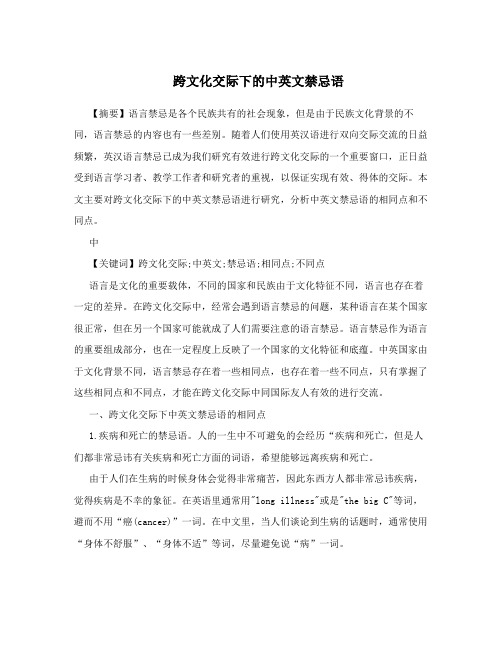
跨文化交际下的中英文禁忌语【摘要】语言禁忌是各个民族共有的社会现象,但是由于民族文化背景的不同,语言禁忌的内容也有一些差别。
随着人们使用英汉语进行双向交际交流的日益频繁,英汉语言禁忌已成为我们研究有效进行跨文化交际的一个重要窗口,正日益受到语言学习者、教学工作者和研究者的重视,以保证实现有效、得体的交际。
本文主要对跨文化交际下的中英文禁忌语进行研究,分析中英文禁忌语的相同点和不同点。
中【关键词】跨文化交际;中英文;禁忌语;相同点;不同点语言是文化的重要载体,不同的国家和民族由于文化特征不同,语言也存在着一定的差异。
在跨文化交际中,经常会遇到语言禁忌的问题,某种语言在某个国家很正常,但在另一个国家可能就成了人们需要注意的语言禁忌。
语言禁忌作为语言的重要组成部分,也在一定程度上反映了一个国家的文化特征和底蕴。
中英国家由于文化背景不同,语言禁忌存在着一些相同点,也存在着一些不同点,只有掌握了这些相同点和不同点,才能在跨文化交际中同国际友人有效的进行交流。
一、跨文化交际下中英文禁忌语的相同点1.疾病和死亡的禁忌语。
人的一生中不可避免的会经历“疾病和死亡,但是人们都非常忌讳有关疾病和死亡方面的词语,希望能够远离疾病和死亡。
由于人们在生病的时候身体会觉得非常痛苦,因此东西方人都非常忌讳疾病,觉得疾病是不幸的象征。
在英语里通常用"long illness"或是"the big C"等词,避而不用“癌(cancer)”一词。
在中文里,当人们谈论到生病的话题时,通常使用“身体不舒服”、“身体不适”等词,尽量避免说“病”一词。
死亡是人们最不愿意看到的字眼,在中英文中表达死亡的词都比较隐晦。
如在英文中通常用“be gone,be no more,,ent off,,ent the,ay of all f lesh”等词。
汉语中仅在《汉语委婉语词典》中表示死亡的别称就有481条之多,有升天、归天、谢世、辞世、与世长辞,寿终正寝、仙逝等。
跨文化交际中中西方的禁忌习俗研究
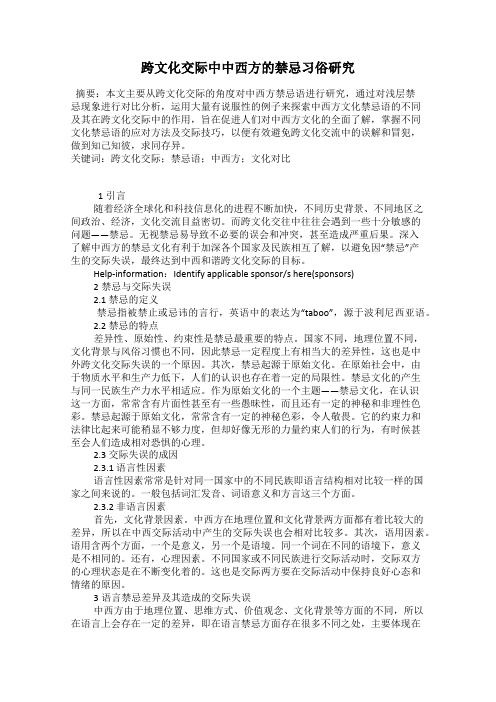
跨文化交际中中西方的禁忌习俗研究摘要:本文主要从跨文化交际的角度对中西方禁忌语进行研究,通过对浅层禁忌现象进行对比分析,运用大量有说服性的例子来探索中西方文化禁忌语的不同及其在跨文化交际中的作用,旨在促进人们对中西方文化的全面了解,掌握不同文化禁忌语的应对方法及交际技巧,以便有效避免跨文化交流中的误解和冒犯,做到知己知彼,求同存异。
关键词:跨文化交际;禁忌语;中西方;文化对比1引言随着经济全球化和科技信息化的进程不断加快,不同历史背景、不同地区之间政治、经济,文化交流目益密切。
而跨文化交往中往往会遇到一些十分敏感的问题——禁忌。
无视禁忌易导致不必要的误会和冲突,甚至造成严重后果。
深入了解中西方的禁忌文化有利于加深各个国家及民族相互了解,以避免因“禁忌”产生的交际失误,最终达到中西和谐跨文化交际的目标。
Help-information:Identify applicable sponsor/s here(sponsors)2禁忌与交际失误2.1 禁忌的定义禁忌指被禁止或忌讳的言行,英语中的表达为“taboo”,源于波利尼西亚语。
2.2 禁忌的特点差异性、原始性、约束性是禁忌最重要的特点。
国家不同,地理位置不同,文化背景与风俗习惯也不同,因此禁忌一定程度上有相当大的差异性,这也是中外跨文化交际失误的一个原因。
其次,禁忌起源于原始文化。
在原始社会中,由于物质水平和生产力低下,人们的认识也存在着一定的局限性。
禁忌文化的产生与同一民族生产力水平相适应。
作为原始文化的一个主题——禁忌文化,在认识这一方面,常常含有片面性甚至有一些愚昧性,而且还有一定的神秘和非理性色彩。
禁忌起源于原始文化,常常含有一定的神秘色彩,令人敬畏。
它的约束力和法律比起来可能稍显不够力度,但却好像无形的力量约束人们的行为,有时候甚至会人们造成相对恐惧的心理。
2.3 交际失误的成因2.3.1 语言性因素语言性因素常常是针对同一国家中的不同民族即语言结构相对比较一样的国家之间来说的。
跨文化交际中汉英禁忌语的对比研究
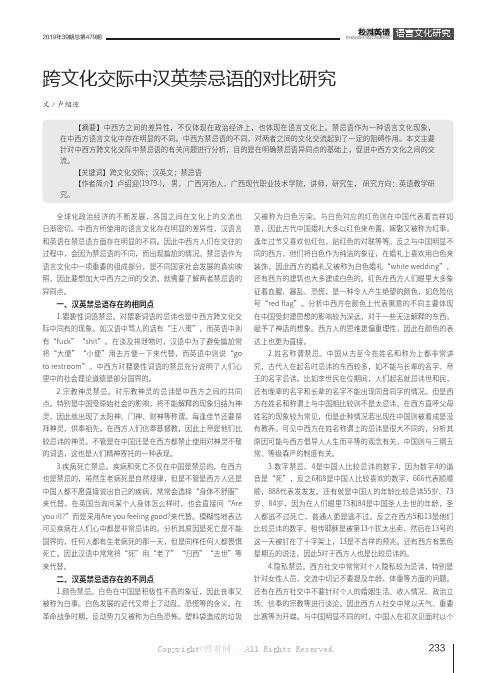
2019年39期总第479期ENGLISH ON CAMPUS跨文化交际中汉英禁忌语的对比研究 文/卢绍迎全球化政治经济的不断发展,各国之间在文化上的交流也日渐密切。
中西方所使用的语言文化存在明显的差异性,汉语言和英语在禁忌语方面存在明显的不同。
因此中西方人们在交往的过程中,会因为禁忌语的不同,而出现尴尬的情况。
禁忌语作为语言文化中一项重要的组成部分,是不同国家社会发展的真实映照,因此要想加大中西方之间的交流,就需要了解两者禁忌语的异同点。
一、汉英禁忌语存在的相同点1.猥亵性词语禁忌。
对猥亵词语的忌讳也是中西方跨文化交际中同有的现象。
如汉语中骂人的话有“王八蛋”,而英语中则有“fuck”“shit”。
在谈及排泄物时,汉语中为了避免尴尬常将“大便”“小便”用去方便一下来代替,而英语中则说“go to restroom”。
中西方对猥亵性词语的禁忌充分说明了人们心里中的社会理论道德是部分国界的。
2.宗教神灵禁忌。
对宗教神灵的忌讳是中西方之间的共同点。
特别是中国受原始社会的影响,将不能解释的现象归结为神灵,因此就出现了太阳神、门神、财神等称谓。
每逢佳节还要祭拜神灵,供奉祖先。
在西方人们信奉基督教,因此上帝是他们比较忌讳的神灵。
不管是在中国还是在西方都禁止使用对神灵不敬的词语,这也是人们精神寄托的一种表现。
3.疾病死亡禁忌。
疾病和死亡不仅在中国是禁忌的,在西方也是禁忌的,虽然生老病死是自然规律,但是不管是西方人还是中国人都不愿直接说出自己的疾病,常常会选择“身体不舒服”来代替。
在英国当询问某个人身体怎么样时,也会直接问“Are you ill?”而是采用Are you feeling good?来代替。
模糊性地表达可见疾病在人们心中都是非常忌讳的。
分析其原因是死亡是不能国界的,任何人都有生老病死的那一天,但是同样任何人都畏惧死亡。
因此汉语中常常将“死”用“老了”“归西”“去世”等来代替。
二、汉英禁忌语存在的不同点1.颜色禁忌。
跨文化交际中中英禁忌研究文献综述

跨文化交际中中英禁忌研究文献综述文献综述对禁忌的产生、类别、意义和功能,以及禁忌语与人类学和心理学的关系进行了深入研究。
随着社会语言学的产生和发展,20世纪80年代后,禁忌现象在西方受到更多社会语言学家和研究者的关注,其中有影响力的著作有D on’t Do It: A Dictionary of the Forbidden, Sociolinguistics 和An Introduction to Sociolinguistics.由于封建思想的根深蒂固,我国对禁忌现象的研究比西方较晚。
1980年三联书店出版的《语言与社会生活》第一次涉及“塔布”, 1983年学林出版社出版的《社会语言学》专门论述了语言禁忌。
20世纪80年代以来,我国学者对语言禁忌现象的研究兴趣浓厚,出版了多本论述禁忌语的专著。
2005年,万建中在他的《中国民间禁忌风俗》一书中对禁忌的起源、本质、种类、功能以及日常生活中的种种禁忌分别进行了详细的介绍。
在第三章第二小节介绍了语言禁忌,他从不吉利词语的禁忌、破财词语的禁忌、猥亵词语禁忌以及对语言禁忌者的嘲笑四个方面入手,书中关于汉语语言禁忌的例子丰富,通俗易懂。
这本著作为我们研究中英禁忌提供了一份详实的参考资料。
此外还有一些书籍主要着眼于跨文化知识及相关基础理论,这些书籍也是本文主要的参考资料。
如胡文仲主编的《中英文化习俗比较》和邓炎昌、刘润清编著的《语言与文化-----英汉语言文化对比》。
他们分别对中英禁忌习俗,禁忌语以及委婉语进行了比较。
在中英禁忌的对比研究中,不少学者也发表了自己的看法和成果,如王君的“浅谈跨文化交际中中英禁忌语的差异”,作者认为英汉禁忌语的差异主要表现在称谓、隐私观念、宗教和亵渎语几个方面。
而后他又论述了产生这些禁忌语的原因,作者认为其中最主要的是民族文化的差异。
而本文主要从跨文化的角度出发,把禁忌语的产生归因于宗教信仰、地位等级和自我心理联想,每一方面都做了详细的阐述,并且用实时性的例子论证了其原因。
跨文化交际背景下的中西方禁忌语比较研究
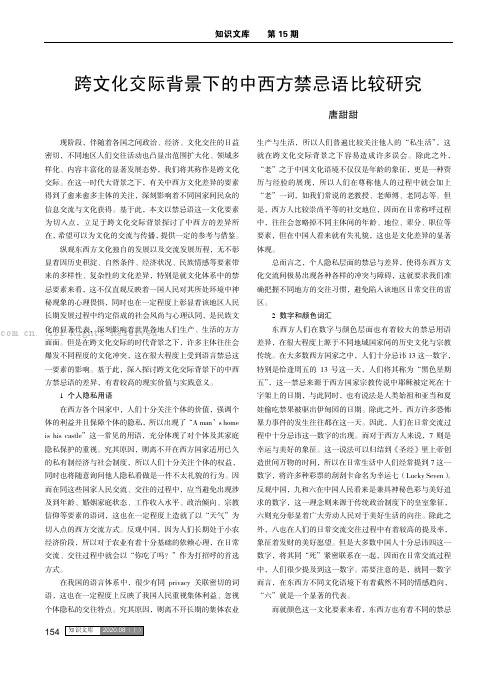
跨文化交际背景下的中西方禁忌语比较研究唐甜甜现阶段,伴随着各国之间政治、经济、文化交往的日益密切,不同地区人们交往活动也凸显出范围扩大化、领域多样化、内容丰富化的显著发展态势,我们将其称作是跨文化交际。
在这一时代大背景之下,有关中西方文化差异的要素得到了愈来愈多主体的关注,深刻影响着不同国家间民众的信息交流与文化获得。
基于此,本文以禁忌语这一文化要素为切入点,立足于跨文化交际背景探讨了中西方的差异所在,希望可以为文化的交流与传播,提供一定的参考与借鉴。
纵观东西方文化独自的发展以及交流发展历程,无不彰显着因历史积淀、自然条件、经济状况、民族情感等要素带来的多样性、复杂性的文化差异,特别是就文化体系中的禁忌要素来看,这不仅直观反映着一国人民对其所处环境中神秘现象的心理畏惧,同时也在一定程度上彰显着该地区人民长期发展过程中约定俗成的社会风尚与心理认同,是民族文化的显著代表,深刻影响着世界各地人们生产、生活的方方面面。
但是在跨文化交际的时代背景之下,许多主体往往会爆发不同程度的文化冲突,这在很大程度上受到语言禁忌这一要素的影响。
基于此,深入探讨跨文化交际背景下的中西方禁忌语的差异,有着较高的现实价值与实践意义。
1 个人隐私用语在西方各个国家中,人们十分关注个体的价值,强调个体的利益并且保障个体的隐私,所以出现了“A man’s home is his castle”这一常见的用语,充分体现了对个体及其家庭隐私保护的重视。
究其原因,则离不开在西方国家适用已久的私有制经济与社会制度,所以人们十分关注个体的权益,同时也将随意询问他人隐私看做是一件不太礼貌的行为。
因而在同这些国家人民交流、交往的过程中,应当避免出现涉及到年龄、婚姻家庭状态、工作收入水平、政治倾向、宗教信仰等要素的语词,这也在一定程度上造就了以“天气”为切入点的西方交流方式。
反观中国,因为人们长期处于小农经济阶段,所以对于农业有着十分基础的依赖心理,在日常交流、交往过程中就会以“你吃了吗?”作为打招呼的首选方式。
- 1、下载文档前请自行甄别文档内容的完整性,平台不提供额外的编辑、内容补充、找答案等附加服务。
- 2、"仅部分预览"的文档,不可在线预览部分如存在完整性等问题,可反馈申请退款(可完整预览的文档不适用该条件!)。
- 3、如文档侵犯您的权益,请联系客服反馈,我们会尽快为您处理(人工客服工作时间:9:00-18:30)。
【标题】跨文化交际背景下的中英文禁忌语对比研究【作者】谢玲铃【关键词】比较;英国禁忌语;中国禁忌语;跨文化交际【指导老师】王露【专业】英语【正文】I. IntroductionIn China, “入境而问禁;入国而问俗;入门而问讳” 1 have been a norm of behavior for thousands of years.Similarly, in west,“when in Rome,do as the Romans do.”is also the norm of western.For the purpose of successful intercultural communication, both east and west people all emphasize on the studying the knowledge of taboos. And linguistic taboo exists universally in almost all of the languages and cultures.The violation of linguistic taboo is regarded impolite and offensive,but people from different cultures do not all agree on what are linguistic taboos and what should be tabooed.Even taboo in the same thing may have different implications,since people from different cultures have established different social customs and cultural orientations.In intercultural communication,they may interpret each other’s speech and behavior in accordance with their own beliefs and values and adopt different politeness strategies to achieve their goals.At the same time,with the development of transportation, information technology and the globalization of economy, communication between people from different cultures are increasingly frequent and extensive.In this process,people are increasingly conscious of the existence of cultural diversity, and they gradually notice that differences produce great barriers to social or intercultural communication.Human tolerance and desire for communication do help to reduce these differences and enhance mutual understanding but there are still some aspects such as some taboos that are beyond people’s acceptability because of its sensitiveness,misunderstanding ,unhappiness,conflict or even disastrous consequences may occur due to the violation of certain taboos.Considering what have been mentioned above, when intercultural communication occurs more frequently and more extensively, a systematic study of linguistic taboos in intercultural communication becomes an imperative.Mastering taboos knowledge in Chinese and English helps to cultivate intercultural competence.It is particular conducive to the management of interpersonal and intercultural conflicts,and enables peopleto produce harmonious relationships.As James Thurber has said in The East and The West, “Precision of communication is important, more than ever, in an era of hair-trigger balances when a false or misunderstood word may create as much a disaster as a sudden thoughtless act.”2II. Literature ReviewA. The Definitions and Features of TabooOxford English Dictionary defines taboo as:words likely to be considered offensive, shocking or indecent by certain people(though not necessarily by everyone).In Chinese taboo is regarded as the indelicate or dirty word.Taboo is explained by the Modern Chinese Dictionary as the prohibited words or actions. According to modern linguists Robinett,taboo is a principle or criterion erected by society, which can prevent people from bad action.As Wardhaugh states:“taboo is one way in which a society expresses its disapproval of certain kinds of behavior believed to be harmful to its members,either for supernatural reasons or because such behavior is held to violate a moral code”. Generally speaking, taboo has about it a sense of something unapproachable,and it is principally expressed in prohibitions and restrictions.Linguistic taboo,as a common social cultural phenomenon in both east and west, exists objectively.It has three features as below.1. TemporalityWith the development of the society, some linguistic taboos changed and some disappeared or lost their original meaning.In the Qing dynasty the poet Xu Jun(徐骏)was killed because his poem had“Qing清”in his poem“清风不识字,何事乱翻书”.B ut he wouldn’t be killed in other dynasties.The poem“清明时节雨纷纷”is widely loved before Qing dynasty.In English, the word“women” was once a taboo in Victorian Age,It meant mistress and adultery wife.But now, it lost its original meaning and became a common word.2. EthnocentricityEvery ethnic group has its own cultural pattern.Linguistic taboo,as an ethnic phenomenon, is influenced by the economy, social structure and belief of the whole group.Take age as an example.Chinese people don’t care about old age.Sometimes, we especially call someone “Zhang Lao张老”,“Wang Lao王老”,for respect.But this is totally unacceptable in English-speaking countries.In their opinion, “old老”means useless,and people will feel offended if they are described to be old.So women keep their age secret in the English-speaking countries and seldom talk about age.3. Context-reliabilityThe usage of taboos is limited by the social conditions and the psychological factors.The context confines the usage of the taboos.In formal situations like social gatherings and banquets,people will pay more attention to taboos,which can be used in private situations.A lot of Chinese taboos are confined by the special contexts .For example, “帆(Fan, has the samepronunciation with overturn) ”. In English,“nigger”is a discriminative word.The African-American can use it and it will not cause serious consequences.But if other ethnic groups use it, serious conflicts will be caused.B. The Definition and Features of Intercultural CommunicationAccording to Asante,in its most general sense, intercultural communication occurs when a member of one culture produces a message for consumption by a member of another culture.More precisely, intercultural communication is a communication between people whose cultural perceptions and symbol systems are distinct enough to alter the communication event. 3 Frequently the term intercultural communication is used when referring to communication between people of different cultural backgrounds.For instance, if one talks with his or her American teacher, intercultural communication takes place.If he or she interacts with a Japanese student, there is intercultural communication.It includes international communication, interracial communication, inter-ethnic communication, inter-regional communication and so on.1. UniversalityNo nation, group,or culture can remain aloof or autonomous.If you touch one part of the world,you touch other parts.People communicate with others from other cultures in one way or another, especially in nowadays when the world has become a global village.Intercultural communication exists everywhere and all the time in our daily lives.No one can shut it off and live totally alone.2. ChangeabilityIntercultural communication is not new.Wandering nomads,religious missionaries,and conquering warriors encountered people different from themselves since the beginning of times.With the development of the new technology and information systems,changes in the world’s population and a shift in the world’s economic area, the intercultural communication has become more and more axiomatic and pervasive.The concrete way of intercultural communication today is greatly different that in the past.It’s dynamic.So we should face it in a flexible and dynamic way rather that in a static way.3. RelativityIntercultural communication is an integrated process rather than a single activity.All the components are interrelated.The change of one aspect will certainly bring about changes in other aspects as well.The study of intercultural communication and people should also take a relational approach, that is,we should study one aspect of intercultural communication in relation to other aspects.We should take all the components into consideration when study intercultural communication.C. Taboo in Intercultural CommunicationAs we can see,it is impossible to separate our use of language from ourculture.In the most basic sense,when we study another language,we will soon discover that not only the symbols(words)and the sounds for these words are different,but also the rules for using them and the factors influencing them are different.Language is the records of culture,so it is the reflection of culture.According to Wilhelm Von Humboldt who is the recognized founder of general linguistics,we can explain the relationship between language and culture as below:Every nation puts her special national intellect into language, making language become the carrier and reflection of this national culture. Meanwhile,her language confines the mind and non-verbal activity of men. That’s why some scholars hold that language is part of culture and plays a very important ro1e in it.Similarly, some social scientists consider language the keystone of culture.According to them, culture would not be possible without language.On the other hand, language is influenced and shaped by culture.It is the reflection of culture.That means,language is the symbolic representation of a people, and it comprises their historical and cultural backgrounds as well as their approach to life and their ways of riving and thinking.Linguistic taboo is a very important part of language.It has something to do with everyone from noblemen to common people.In every language,there are linguistic taboos more or less.In everyday life and work, violation of taboos is regarded as very rude and improper even cause very serious consequences.So people who are encountering people from other cultures have to pay attention to the different usage of others ’taboos.In nowadays,intercultural communication between different cultures is becoming more and more frequent and universal.Lack of knowledge in this part of language especially improper use of taboos will undoubtedly result in misunderstandings,conflicts and other unknown serious consequences in intercultural communications.In order not to cause such serious consequences, people should get a deeper understanding of foreign culture and the usage of taboos.To sum it up, intercultural communication involves different cultures and causes the cultural collision.Language has taken a significant responsibility during this process.It’s the bridge connecting different cultures.Without language,it is hard for people from different cultures to carry on intercultural communications.Taboo is part of language and plays an important role in intercultural communications.Since different cultures have different taboos,people should pay special attention to them. Ⅲ. Comparison of Chinese and English TaboosA. Chinese Taboos and English Taboos1. Taboos on SexIn the western world,there are taboos on sex,certain body parts.People find it difficult to talk about going to the toilet,and have invented numerous ways of avoiding direct reference to the topic.Among good friendsand acquaintances it may be acceptable to directly ask the location of the toilet or mention the bodily functions for which one needs to use it,but in other situations people might ask:‘‘Where could I wash my hands?’’ In movies and in television, for example,women often say in a restaurant that they need to go and powder their noses or that they need to freshen up when they need to use the toilet.There are,also a number of different ways to refer to having sex,including to sleeping with,go to bed with and make love, as mentioned by Hughes in the discussion of metaphorical means of avoiding direct reference.In China,people use a great deal of euphemisms for sexual organs and act,and even for marriage and pregnancy because they have relationship with sex.People use many euphemisms for toilet and body exertion as well,for example,夫妻之礼,鱼水之欢for sex action,出恭,大解,小解,更衣for exertion,有喜,怀珠,身子重for pregnancy.The intellectuals and the upper classes in ancient China created these euphemisms,because they thought it a shame to mention them directly.In nowadays,most of such euphemisms are not used any longer by most people.Some are kept to avoid rudeness and embarrassment in conversation,but in most situations,people just avoid mentioning them for politeness,especially in public and on formal.2. Taboo on GenderRecently due to the development of social equality, gender discrimination has become a linguistic taboo.“Gender discrimination” is often based on gender stereotypes of a particular society, i.e. considering men physically strong and women as emotionally sensitive.With wome n’s Movement in the 1960s and the criticism on the prejudice in language,a lot of traditional words that may show prejudice against women are now replaced by new created words for the females.The words showing prejudice against the females are considered to be taboos like chairmen,postman and so on.In Chinese,although women were liberated in the civil revolution,the status of women are enhanced nowadays,there are still some gender discriminations in society.Keeping females away from general education,holding that they are not supposed to participate in any economic activity so there’s no need to educate them,is one of the major examples from Asian social setups.Women are discouraged in other social concerns as well,for instance people will heartily accept a man as their leader even if he has some criminal record in the past,but for a woman it’ll be impossible to become the leader of a mass(for a social issue)if she’d been involved in a minor crime.Some companies only invite applications for a job to the male,and even in the job advertisements,reading“no female” obviously.In some areas of the state,feudal thoughts deeply influences thoughts of adults so that some people only like boys and for girls,who sometimes are confronted with miserable destinies,like abandoned, fostered,etc.3. Taboos on DeathChinese and English-spoken people tend to avoid mentioning death and illnessdirectly and intentionally.They are afraid of being ill because it brings forth sad memory.Both people try to employ roundabouts and euphemisms instead of taboos.Taboo on the dead includes the taboo against touching of a corpse and those who are caring for it;the taboo against mourners of the dead;and the taboo against anything associated with the dead(e.g.,the dead person’s name).In the US,attitudes toward death along with sexuality and a huge emphasis on Christian morality and social etiquette,was very stringent and any discussion or jokes about death was hailed a serious taboo,in part of the mourning process and death promotes “mental” gr aphic imagery.The taboo on naming the dead prohibits any utterance of a dead man’s name or any other words similar to it in sound.The Chinese have many taboos where death is concerned.You should avoid attending a funeral and a wedding on the same day.Also,avoid going to another person’s house after going to a funeral wake.English and American people seldom say He died,they will say:He went to get rewards.(他去领奖了),He fell asleep.(他躺下长眠了),He passed away.(他离去了),He breathed his last.(他咽下了最后一口气). In Chinese,the emperor died,which is called Jia Beng (驾崩).If a person with some social status died,which is called Xian Shi(仙逝). In English culture,death is also substituted,like,joint the silent majority, pass away, go to heaven,fall asleep,pass beyond,fade,be at rest,close one’s eyes,breathe the last breath,be heard of no more,go to grass,go to sleep for forever etc.According to Geoffrey Hughes in A History of English Words, death is often referred to as a “metaphorical journey in comforting variants and traditional forms such as:passing on ,going to one’s Maker and joining the majority”.4Other less-dignified ways of referring to death include to resigning one’s being, moving into upper management and being no longer eligible for the census (Death).4. Taboos on SicknessBecause in different culture, people think that infractions of taboos can lead to illness or death, as well as to the lesser penalties of corporal punishment,incarceration, social ostracism or mere disapproval,they do avoid tabooed behavior unless they intend to violate a taboo.People use terminal illness in place of cancer.There are some examples,for example,AIDS(Acquired Immune Deficiency Syndrome,Big C(Cancer),DT’S(delirium Tremens),V.D(Venereal disease),B.O(body odor).In old China, people always abstain from illness,so when they named themselves,like Huo Qubing, Xin Qiji,Zhang Zhuang, Li Kang and so on.In America, patients have rights to know his true illness and if the patient requires telling his illness,the doctor should tell in truth.In Chinese culture,if the patient gets heavy illness,the doctor and family dependents are inclined to conceal the state of his illness to relieve his pressure.If people have some mental and intelligent illness,they will periphrase,like He's not all there.He's a little bit on the slow side.5. Taboos on ColorsTaboos on colors may not been noticed easily, but they do shape the communication process.Chinese people like the color red,like the red face of Guanyu, indicating trustworthy.But to Americans,Two colors are taboos,red and black.The Biblical mason given for the aversion from anything red in their dress is that“Jesus was given a red dress by the Jews”.They think red indicates danger.Linked with this aversion from the color red,is the fact that blood according to Zionists is taboo.Black is the color of death,which is similar to Chinese taboo.White,in China, people use it to express sorrow while Americans think it to be an active and effective color:it carries with it purity and purification and acts as a guarantee that the the magical defilement had been washed away.Color is both a direct and indirect source of taboo.6. Taboos on NumbersThe last taboo we address is numbers.Numbers are associated with bad luck and even death in many countries.Curiously, it tends to be different numbers for different cultures.In China, we don’t like to mention the number 4,because the pronunciation of 4 is similar to the death “si” in Chinese.The Chinese feel that four is the most negative number because it sounds like the word for death.Hotels in China, Hong Kong, and Taiwan often have no fourth floor and some Asian airports have no Gate 4.Number also has positive meanings in China.For example,the number six represents happiness,and nine represents long life.For many Chinese,having an uneven number of people in a photograph will bring bad luck,such as that the middle person in a photo of three people will die.Number Superstitions can be very important when building global relationships.Both Chinese and American have some taboos in numbers,but they are different.In consequence,in China, some people don’t like living on the fourth floor.Because of this ,some buildings do have the fourth floor, but they don’t call it the fourth f loor.In America, if they invite some friends for dinner and it happened that there are 13 people sitting at the table,the host will invite another friend for they think 13 is unlucky.While American don’t like the number 13,which is considered to be unlucky.People of the United States,for example,think that 13 is an unlucky number .Most U.S.American hotels do not have a 13th floor, and even a hotel number ending in 13 may be refused.Friday the 13th is perceived as an unlucky day, causing people to not schedule important events on this day.B. Similarities and Differences between Taboos in Chinese and English1. SimilaritiesAs human beings have a lot in common, the taboos in Chinese and English have some similarities.First, both Chinese and English-spoken people avoid mentioning death and illness intentionally.They are afraid of being ill because it is very sadmemory.Both people try to employ roundabouts and euphemisms instead of the taboos.Second, both Chinese and English have taboos on body parts as buttocks,breasts and sex organs as well as excretion actions even some related places,menstruation, pregnancy and the related terms.Both people regard it shame to speak out those words because people consider these things to be not clean and try to avoid these things in language.2. DifferencesBecause of the differences between the social development and the cultural inheritance of China and the English-speaking countries,the linguistic taboos in Chinese and in English have differences.First, generally speaking, Chinese taboos tend to show a negative use of language, to serve as a means of moral cultivation for men of noble character and a means of self-restraint for the common people, to reflect the wish for harmony of the Chinese people.However, English taboos tend to show a positive use of language, to serve as a social marker of status,to reflect the aspiration for elegance in language and the soul.Second, in Chinese, people use different euphemisms for taboo words to refer to the deaths to different people,because deaths of different people are not the same.As we stated above, the death of the emperor is called“驾崩”,and the death of the common people is called“死”.The death after longevity is regarded as a great bliss in Chinese.In English-speaking countries,people regard the deaths of all the people the same,a11 of which age the punishment from God and related with their sins.Death is equal to everybody, no matter he or she is rich, noble or not.Third, Chinese people are reluctant to refer to illness because they think the ill person can get better by doing so and they can avoid the misfortune the illness brings and to show comfort and respect to others.While English-speaking people are reluctant to refer lo illness because they believe that illness is shameful and will bring trouble to others.Fourth, English taboos on vulgarities are rampant, and more complex than those Chinese ones.There are taboos on legs,breasts and some parts of clothes.But in Chinese,taboos are not so detailed.For Chinese people,the taboo on vulgarities is more of a means of self-discipline.It is just a need for the literary men or men of noble character to cultivate their morality, not a social marker of class.As a result, there is no need for the common people to imitate the elegant language of the literary men to reach a high hierarchy of class.In English, people will define the upper class and the lower class according to the taboo in their daily speech.Fifth, taboo on ominous matter and deficiency is another important and complex aspect in Chinese which is quite different from the situation in English.Chinese people pay much attention to the taboos on departure, danger, failure in business and study because they believe they can avoid the misfortunes and get roundness by using the taboos.While in English,people are not afraid of referring these things.Sixth, in English, taboo connected with discrimination is a very important branch people should pay attention to,especially in the USA.In Chinese,people have some taboos on discrimination on minor peoples, but not as evident as that in English nowadays.Ⅳ. Strategies to Manage Taboo in Intercultural CommunicationA. Question-asking StrategyExperimental results show that generally speaking,judicious question asking can improve communicative performance.However, the study makes clear the importance of understanding the value of different types of information to learning in different contexts.Take the communication with Americans as an example,we should be careful and show no ill intent if we say something about God to someone who believes in religion.As long as they get that we just want to learn personally, they usually respond in a positive way.B. Self-revealingSelf-revealing communication is a vital bridge between cultures.Such self-revelation does entail vulnerability.Self-expression leads to more effective communication and understanding, which in turn fosters greater trust and intimacy.It can cause the other party to change their behavior by their own choice, whereas a more coercive approach would simply provoke defensiveness and distancing. Self-revealing communication has transformative potential.When we practice self-revealing expressiveness we are developing just such a capacity in ourselves,and are encouraging it in our partner also.C. Euphemism and VaguenessPeople try to avoid using words and expressions that are unpleasant, inappropriate or embarrassing to themselves or to the people to whom they are speaking.Such consciously-avoided words and expressions can be considered taboos.Taboos were originally concerned with sacred matters that could not be discussed,but nowadays taboos usually concern things that people are ashamed of.The existence of taboos throughout history has created a need to find words and expressions that enable people to talk about the subjects concerned without feeling uncomfortable or being afraid of hurting another person’s feelings.Such words and expressions are referred to as ““euphemisms”.Vagueness is one of the euphemistic strategies.Vagueness involves people using a superordinate term when referring to a sensitive topic.These include,for example institution when referring to a mental hospital,time when referring to a period spent in prison and adjust when talking about changes that are “likely to pr ove embarrassing or unpopular”.In daily conversation euphemism can be seen as a natural result of what Leech has termed the politeness principle:we will avoid unpleasantness6.We saw a polite euphemism when we discussed metaphors flouting the maxim of quality (see the cooperative principle).“It is this principle whichunderlies the use and development of euphemisms.Politeness also enters into ways of addressing people”.7So euphemisms like the elderly, senior citizen are created to refer to old people.Marriage as individual privacy in English culture,So when conversation takes place,people avoid talking about the marriage.The use of euphemisms enables people to talk about embarrassing,painful or inappropriate issues that are considered to be social taboos.However, in time the euphemistic expressions might receive the same negative connotations that the original term had;new expressions will be needed once again.As long as there continue to be unpleasant topics that people prefer not to refer to directly, people will continue to use euphemisms to talk about these topics.When we communicate with others,like foreigners,to communicate successfully, we should take fair attitudes towards different people from different cultures. Communicative skills and strategies such as the question-asking strategy and self-revealing are indispensable for promoting the effectiveness of intercultural communication.Euphemism is an effective way to dealing with linguistic taboos.In sum,knowledge in culture can help students speak politely and behave appropriately.Such knowledge together with proper communicative skills and strategies is of great help for communicators to manage linguistic taboos,reduce pragmatic failure and improve the efficiency of intercultural communication.Ⅴ.ConclusionEvery nation has its own norm of doing things or speaking.Taboo as a very important linguistic behavior constitutes a very important part of this norm.This thesis begins with a general description of the study.As this thesis aims at providing some help for the readers’ intercultural communication, some relevant terms are introduced as well as their features and the relationships between taboo and intercultural communication for the purpose of preparing readers with some cultural fluency.In the process of introducing the taboos in Chinese and English,just as the English saying goes,“there is no smoke without fire.”The differences that arise in out social interaction must have their cause deeply-rooted in each culture, so this thesis devotes some space to discussing the related factors influencing those taboos。
